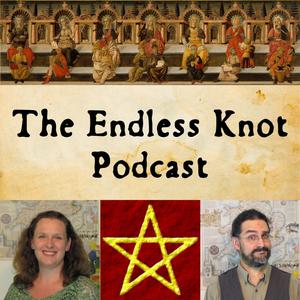
The Endless Knot
Mark Sundaram
Aven & Mark discuss etymology, history, literature, language, and cocktails, and the sometimes surprising connections between them all.
- 1 hour 17 minutesEpisode 123: Words Christmas Gave Us, with Grace Tierney
Grace Tierney is back with another great book about the word origins, this time “Words Christmas Gave Us"! She regales us with festive stories and we talk about some of the fun traditions and treats of the winter holidays.
It’s been a long, unintended break since our last episode, but we’re happy to be back at it, in time to wish everyone very happy holidays!
This podcast is licensed under a Creative Commons Attribution-ShareAlike 4.0 International License
17 December 2024, 12:00 pm - 1 hour 1 minuteEpisode 122: Says Who, with Anne Curzan
We spoke with Dr. Anne Curzan about her new book, “Says Who? A Kinder, Funner Usage Guide for Everyone Who Cares about Words”. We talk about language change, inner grammandos, the benefits of learning the rules of texting from one’s students, and of course, surprising connections!
Also, please check out the Defeat Depression fundraising event, and the Sudbury Walk/Run on May 25.
This episode on YouTube
This podcast is licensed under a Creative Commons Attribution-ShareAlike 4.0 International License
1 May 2024, 2:35 am - 1 hour 11 minutesEpisode 121: The Vesuvius Challenge, with Stephen Parsons
Buried deep under volcanic ash lie hundreds of burnt scrolls containing texts from the first century. A new project is driving the work to try to read these chunks of carbon, to uncover new works and open new doors into the past. We spoke to one of the leaders of this project, Dr. Stephen Parsons, about the Vesuvius Challenge, the technical aspects of ‘virtual unrolling’, the possibilities of new classical texts, the development of new ways of doing scholarship, and more.
Also, please check out the Defeat Depression fundraising event, and the Sudbury Walk/Run on May 25.
This podcast is licensed under a Creative Commons Attribution-ShareAlike 4.0 International License
31 March 2024, 11:00 pm - 59 minutes 1 secondEpisode 120: Swimming in History, with Karen Carr
We talked to Dr. Karen Carr about the global history of swimming — in myth, folktale, and history. Who swam, who didn’t, and how do the stories different cultures told reflect these patterns? We also talked a bit about Dr. Carr’s next book, all about silver, women, and textiles.
Dr. Carr’s history website and blog, Quatr.us
This podcast is licensed under a Creative Commons Attribution-ShareAlike 4.0 International License
29 February 2024, 12:00 pm - 1 hour 34 minutesEpisode 119: An Ecological Chain
We discuss the language and history of the ecological sciences, all the way back to the ancient Greeks, and the development of the food chain and food web models of ecological systems. And apologies for the unscheduled hiatus!
Cuckold video and podcast
Frank N. Egerton. “A History of the Ecological Sciences: Early Greek Origins”, Bulletin of the Ecological Society of America 82.1 (2001): 93-97
———, “A History of the Ecological Sciences, Part 2: Aristotle and Theophrastos”, BESA 82.2 (2001): 149-152
———, “A History of the Ecological Sciences, Part 3: Hellenistic Natural History”, BESA 82.3 (2001): 201-205
———, “A History of the Ecological Sciences, Part 4: Roman Natural History”, BESA 82.4 (2001): 243-246
———, “A History of the Ecological Sciences, Part 5: Byzantine Natural History”, BESA 83.1 (2002): 89-94
———, “A History of the Ecological Sciences, Part 6: Arabic Language Science—Origins and Zoological Writings”, BESA 83.2 (2002): 142-146
———, “A History of the Ecological Sciences, Part 7: Arabic Language Science—Botany, Geography, and Decline”, BESA 83.4 (2002): 261-266
———, “A History of the Ecological Sciences, Part 8: Frederick II of Hohenstaufen: Amateur Avian Ecologist and Behaviorist”, BESA 84.1 (2003): 40-44
———, “A History of the Ecological Sciences, Part 9: Albertus Magnus: a Scholastic Naturalist”, BESA 84.2 (2003): 87-91
This podcast is licensed under a Creative Commons Attribution-ShareAlike 4.0 International License
31 January 2024, 12:00 pm - 1 hour 21 minutesEpisode 118: A Crisis of Masculinity, with Melanie Racette-Campbell
We talk to Melanie Racette-Campbell about her new book, “The Crisis of Masculinity in the Age of Augustus”, and discuss why Roman elite men were particularly vulnerable to a societal transformation that changed their role in the state. What did it mean to be a good man in ancient Rome, and how and why did that change?
Melanie’s book is available here
This podcast is licensed under a Creative Commons Attribution-ShareAlike 4.0 International License
31 August 2023, 11:00 am - 1 hour 21 minutesEpisode 117: A Brief History of Misogyny
The word “chauvinism” is an unlikely eponym, but it turns out that the story behind it has all sorts of interesting connections. And our discussion of those connections also leads us into the long history of misogyny in the western world, from Eve and Pandora to the Virgin Mary, courtly love, and Victorian womanhood.
Cocktail: Pandora’s Jar, from Nectar of the Gods
This podcast is licensed under a Creative Commons Attribution-ShareAlike 4.0 International License
4 July 2023, 11:00 am - 1 hour 25 minutesEpisode 116: A Quiverful of Time Arrows
We look at the history of English’s conceptualization of time, and update Mark’s research on spatiotemporal metaphor. Also, words for arrows, the surprising origin of ‘toxic’, and a bit of Latin poetry!
This podcast is licensed under a Creative Commons Attribution-ShareAlike 4.0 International License
30 May 2023, 11:00 am - 1 hour 25 minutesEpisode 115: Like, Literally, Dude! with Valerie Fridland
We spoke to Dr. Valerie Fridland about her new book, “Like, Literally, Dude!” and talked about the fascinating role that many ‘errors’ in English speech actually play in communication. We discuss the never-ending changes that English has gone through, the surprisingly sophisticated rules behind our use of ‘um’ and ‘uh’, and much more.
Dr. Valerie Fridland’s website
This podcast is licensed under a Creative Commons Attribution-ShareAlike 4.0 International License
25 April 2023, 11:00 am - 1 hour 12 minutesEpisode 114a: The XYZ’s of Spelling
It’s Part 2 of our mega-episode on spelling! This time, we get into some of the notorious mismatches between English spelling and modern English pronunciation. Explaining them takes us all the way back to Phoenician — several times — but maybe, just maybe, some bits of this odd language will make more sense to you when we’re done!
Christopher Upward & George Davidson, The History of English Spelling (2001)
David Sacks, Letter Perfect (2003)
Kevin Stroud, The History of the Alphabet (audiobook)
NativLang “Thoth’s Pill - an Animated History of Writing”
This podcast is licensed under a Creative Commons Attribution-ShareAlike 4.0 International License
4 April 2023, 11:00 am - 1 hour 12 minutesEpisode 114: The ABC’s of Spelling
We’re wading into the messy world of English spelling in this episode — the first of two, since we couldn’t fit all of the ‘quirks’ of the language into one episode. The history of orthography in English is all tangled up with the history of the alphabet, so in this part we trace some of the twists and turns that resulted in our modern script.
Christopher Upward & George Davidson, The History of English Spelling (2001)
David Sacks, Letter Perfect (2003)
Kevin Stroud, The History of the Alphabet (audiobook)
NativLang “Thoth’s Pill - an Animated History of Writing”
This podcast is licensed under a Creative Commons Attribution-ShareAlike 4.0 International License
28 March 2023, 11:00 am - More Episodes? Get the App
Your feedback is valuable to us. Should you encounter any bugs, glitches, lack of functionality or other problems, please email us on [email protected] or join Moon.FM Telegram Group where you can talk directly to the dev team who are happy to answer any queries.
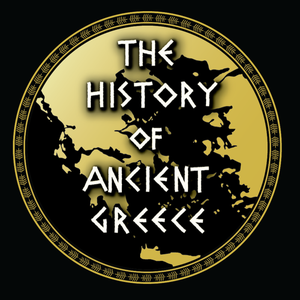 The History of Ancient Greece
The History of Ancient Greece
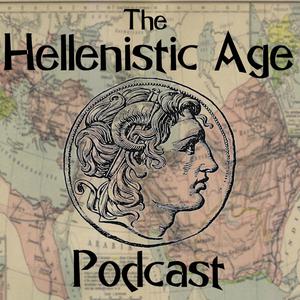 The Hellenistic Age Podcast
The Hellenistic Age Podcast
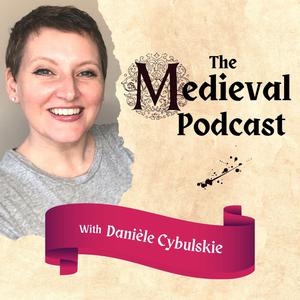 The Medieval Podcast
The Medieval Podcast
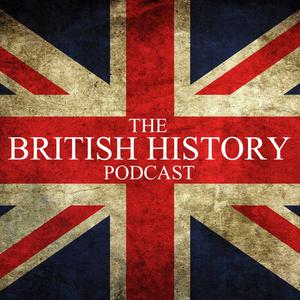 The British History Podcast
The British History Podcast
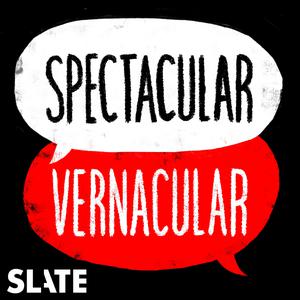 Slate Debates
Slate Debates
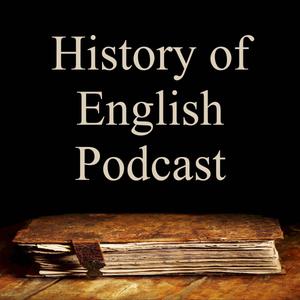 The History of English Podcast
The History of English Podcast